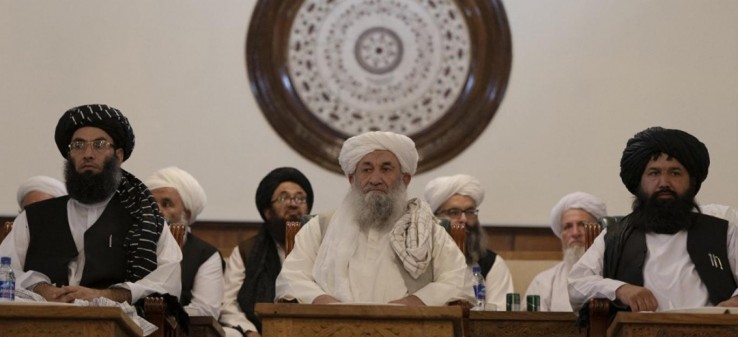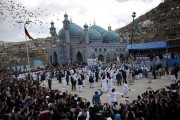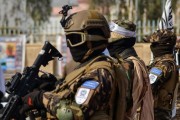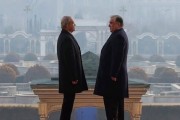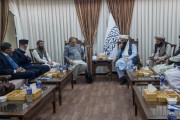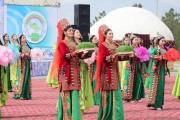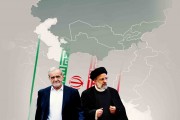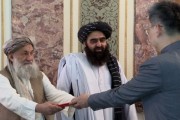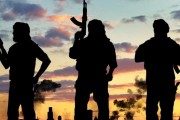Publish Date
Saturday 16 March 2024 - 10:56
recommended
0
The Durability of Taliban Rule and the Future Prospect
After the fall of the republic government and the Taliban’s regaining power in Afghanistan, this movement was not prepared to rule Afghanistan in terms of politics and governance. Also, from a military point of view, the Taliban fighters did not have the experience of creating and managing national institutions, such as the army and the police. It was for this reason that at the beginning, the stability and permanence of the Taliban rule in post-2021 Afghanistan seemed to be unstable and uncertain, and some experts believed in a short-term survival of the Taliban government. But contrary to expectations, Taliban rule was established in a good momentum and was stabilized to some extent. In this article, "establishing factors" and " durability factors" of the Taliban rule in Afghanistan are reviewed.
By: waliullah Moradian
Introduction
The collapse of the republican system in Afghanistan and the re-establishment of the Taliban government is not a simple event, and should be considered as a serious phenomenon with consequences at the Afghan, regional and international levels. Although security and military issues played an undeniable role in Taliban's victory, interactions and other political variables at the regional and international levels were the main factor in the Taliban's victory. The scale and extent of these developments and variables were to such an extent that the republican system in Afghanistan was not able to manage it for its own benefit, or to remain unharmed from its consequences. In such a situation, the Taliban’s victory turned into an inevitable and quick event.
Despite this, the Taliban was not prepared to rule Afghanistan in terms of politics and governance. And militarily, the Taliban fighters did not have the experience of creating and managing national institutions, such as the army and the police.
It was from this point of view that at the beginning, the stability and durability of the Taliban rule in post-2021 Afghanistan seemed to be unstable and uncertain. However, contrary to expectations, Taliban rule was established in Afghanistan at a good speed and was stabilized to some extent.
In this article, "establishing factors" and " durability factors" of the Taliban rule in Afghanistan are reviewed.
Part 1: The establishing factors of the Taliban rule
After more than two years of the Taliban rule, many hypotheses and predictions were invalidated, and at the same time, the decisive role of some factors in establishing and stabilizing Taliban rule was proven. From this point of view, the factors that have played a role in the establishment and stabilization of Taliban rule so far are as follows:
Preventing intra-group differences
At the beginning of the re-establishment of the Taliban's rule in Afghanistan, analysts and Taliban oppositions predicted that there would be devastating differences among the different factions of the Taliban in the process of power distributing and dividing political advantages. At that time, it was believed by the author of this article that the factional differences of the Taliban are exaggerated in the media, and analysts should not be influenced by the media and abstract atmosphere. On the other hand, the Jihadi leaders opposing the Taliban considered the pattern of internal differences of the Jihadi leaders in 1990’s as a dominant pattern, and believed that this experienced pattern would also fragment the Taliban. But they ignored the fact that political developments in each era have their own variables.
Although the existence of differences among different factions of the Taliban cannot be completely denied, there is another truth: The Mujahideen's learning from the differences of the 1990s has been a factor in the stability of the Taliban government since 2021. Based on this, a belief has emerged among the people and supporters of the Taliban that says: "The Mujahideen had divided and eradicated in the 1990s. We will not divide, and will not be eradicated." So, it can be said that one of the most fundamental factors that has stabilized the Taliban's rule so far is maintaining unity and preventing factional differences in the Taliban government.
Creating relative security
The sociology of war and collective psychology in Afghanistan show that the general public of Afghanistan is completely tired and disgusted with "war and violence".
The general expectation was that with the establishment of the republic system and international support, public security in Afghanistan would be established forever. But due to any reason, the previous system could not provide public security in Afghanistan. On the contrary, the Taliban government was able to ensure public security in Afghanistan, despite imposing restrictions on public freedoms. This situation, both increased the Taliban's self-confidence and attracted public support for the Taliban rule, and had a very serious impact on the stabilization of the Taliban rule.
Ethnic support for the Taliban government
Political power in every society has its own features. A correct understanding of power features in Afghanistan plays a decisive role in the accurate understanding of the political developments of this country. Political experiences in Afghanistan clearly prove that political power in Afghanistan is ethnic in nature. Since 1940s, simultaneously with the growth of nationalist ideas in the region including the idea of Pan-Turkism in Turkey, the Afghanistan’s rulers tried to strengthen and stabilize their political rule based on ethnicity. Although this type of policy created severe ethnic differences in Afghanistan, it created a special kind of unity between the ruling power and the Pashtun people. This is why the entire reign of Zahir Shah and Daoud Khan is considered as the period of absolute political authority of the Pashtun people, and the developments of the last half century, especially the two decades of the republican system, are considered as the decline of the political power of Pashtuns. The fact that even some young generations of secular Pashtun intellectuals support the Taliban government is rooted in the same nostalgic feeling of the Pashtuns towards the absolute authority of Pashtuns in the era of Nader Shah, Zahir Shah and Daoud Khan. The Pashtun elites see the Taliban as a way of reviving the absolute and historical authority of the Pashtuns.
This issue is not just a historical reminder or a theoretical subject, but it is the main factor in the developments of the last three decades, and an effective factor for stabilizing the Taliban rule. For example, in the 1990s, Burhanuddin Rabbani's government was seen by the Pashtun elites as a deviation of history and the transfer of political power from the Pashtuns to the Tajiks. The flare-up of the civil war between Gulbuddin Hekmatyar the leader of Hezb-e-Islami, and Jamiat-e-Islami was also rooted in in the same issue. So, Burhanuddin Rabbani's government had no root and place among the traditional Pashtuns of Afghanistan to support or protect it. For this reason, the Taliban arose from the Pashtun rural people in remote areas of Afghanistan and overthrew Rabbani's rule. During the republic governments of Hamid Karzai and Ashraf Ghani, political power was relatively distributed among different ethnic groups, and the absolute authority of the Pashtuns was lost. Therefore, this system was not compatible with the Pashtuns' nostalgic sense and historical memory of the authority in Zahir Shah’s period. For this reason, the Pashtuns of the south and east tribes of Afghanistan did not support the republican system, and the traditional and rural groups of the Taliban gained power in those areas again, and finally, with the fall of the republican system and the resurgence of the Taliban, they established the authoritarian Pashtun government, without the participation of other ethnic groups and religions.
A very remarkable point is that this authoritarian Pashtun government not only has no opponent in the tribal areas like the past three decades, but also these traditional and rural tribes are strategic supporters of the Taliban and the survival of the Taliban is rooted in the soil of those areas. Paying attention to this point is very effective in understanding the current and future developments in Afghanistan. The reason why the Islamic State in Khorasan Province (ISKP) could not take root among these Pashtun rural areas like the Taliban, is precisely rooted in the Pashtuns' view of power and their understanding of political power. According to the Pashtuns, the Taliban government strengthens the absolute authority of Pashtuns, but the ISKP caliphate may digest and absorb the absolute power of Pashtuns in another Islamic empire. Therefore, one of the factors that stabilizes the Taliban rule is the ethnic support of the Taliban government.
The weakness of political and military oppositions of the Taliban
At the beginning of the re-establishment of Taliban rule, the formation of a strong military resistance front following the model of Ahmad Shah Massoud's military resistance in Panjshir and northern Afghanistan was very likely, and the consolidation of Taliban rule was seriously questioned. But time proved that many former jihadist leaders do not have the past place in the memory and minds of the Afghan people, and have lost the power of public mobilization. As much as the chance of gaining power and the success of the political oppositions of the Taliban weakened day by day, the chance of establishing the rule of Taliban in the Afghan public opinion increased.
Although the growth of ISKP in Afghanistan was considered a major obstacle to the consolidation of the Taliban rule, ISKP does not belong to the ethnic and native groups of Afghanistan. Therefore, the Taliban was easily able to stop the growth and spread of ISKP among the tribes, and prevent it from having a definite front and a certain territory in Afghanistan.
Although neither ISKP nor the resistance fronts have completely disappeared, but in the current situation, they are not in a position to create a serious threat to the stability of the Taliban rule so soon.
The Taliban government’s alignment with the regional order
Military victory, without political authority, will never stabilize the political governance of a group. The military victory of the Taliban in the 1990s led to the Taliban's military dominance over Afghanistan, but it did not stabilize the political rule of the group in Afghanistan. This was due to the fact that no country in the world (except for Pakistan, the United Arab Emirates and Saudi Arabia) recognized the political governance of the Taliban. However, in the resurgence of the Taliban after the withdrawal of the United States, the countries of the region collectively engaged in political and consular interaction with the Taliban government, and entered into political relations with the administration of Kabul as a de facto government. Even the Chinese government officially sent an ambassador to Kabul, and received the Taliban ambassador with official ceremonies.
From this point of view, one of the factors that played a very serious role in stabilizing the Taliban rule was the regional interaction with it. In fact, the stabilization of a political government requires two things: self-confidence and authority of the rulers themselves; and its acceptance and recognition by other countries. This is why the military powers do not have a chance to stabilize their rule without the interaction of regional countries, even if they have a complete control over the capital of a country.
Therefore, the interaction of regional countries, on the one hand, stabilized the political rule of the Taliban, and on the other hand, prevented the growth of opposition fronts against the Taliban in these countries.
Based on this, it can be said that the stabilization of the political government of the Taliban owes a lot to the interactive policy of the regional countries and Afghanistan's neighbors.
The main reason why regional countries, especially America's rivals in the region, established interactive relations with the Taliban government is that the Taliban refused to securitize Afghanistan's geography against regional countries. Experience has shown that whenever the territory of Afghanistan becomes a security threat to the countries of the region, either by the ruling power or by the presence of a foreign power, the countries of the region think of a new alternative to administrate Kabul. Most likely, the Taliban considered this historical experience in its political assessment.
In any case, the comprehensive interaction of regional countries and Afghanistan's neighbors with the Taliban has played a key role in stabilizing and establishing the Taliban rule.
Part 2: The durability factors of the Taliban rule
Consolidation and establishment of the Taliban rule in Afghanistan does not mean its continuity. The republican system in Afghanistan was legally stabilized and was structurally well established, but this stabilized system did not last. So, in addition to stabilizing factors, the Taliban government urgently needs factors that will pave the way for its continuity. Three important factors can lead to the durability of Taliban rule in Afghanistan:
Adopting a real neutrality policy
The first thing that threatens the stability and durability of the Taliban government is the competition game between the great powers. Historical experience shows that Afghanistan has long played the role of a buffer or insulator between competing players at the international level. Countries such as Afghanistan, which play such a role, usually become a place for conflict and war, either when they accept hosting one of the rival powers in their territory, or when one of the rival powers occupies that territory by force and turn that geography into a watch tower to monitor the activities of neighboring and rival countries. The occupation of Afghanistan by the former Soviet Union, and later by the United States, have been two real examples for this hypothesis.
Even though Afghanistan, to a large extent, no longer plays the role of a buffer (like the great games of the colonial era), it is still exposed to the danger of becoming a battlefield for rival powers. The reason for this threat is that in the post-colonial era and in the era of arms races, great powers need a "battlefield" for any reason. In this situation, countries and governments with weak governance and internal conflicts are usually considered as battlefield for big rivals. These types of weak governments are referred to as "failed states" that are unable to protect their existence. Afghanistan has been a perfect example of a failed state in the last half century.
The evidence shows that even with the new Taliban government, Afghanistan is still considered a failed state, and the threat still remains that this country will become a competitive battlefield. In order to get rid of this potential threat, the Taliban government should adopt two strategies:
Introduction
The collapse of the republican system in Afghanistan and the re-establishment of the Taliban government is not a simple event, and should be considered as a serious phenomenon with consequences at the Afghan, regional and international levels. Although security and military issues played an undeniable role in Taliban's victory, interactions and other political variables at the regional and international levels were the main factor in the Taliban's victory. The scale and extent of these developments and variables were to such an extent that the republican system in Afghanistan was not able to manage it for its own benefit, or to remain unharmed from its consequences. In such a situation, the Taliban’s victory turned into an inevitable and quick event.
Despite this, the Taliban was not prepared to rule Afghanistan in terms of politics and governance. And militarily, the Taliban fighters did not have the experience of creating and managing national institutions, such as the army and the police.
It was from this point of view that at the beginning, the stability and durability of the Taliban rule in post-2021 Afghanistan seemed to be unstable and uncertain. However, contrary to expectations, Taliban rule was established in Afghanistan at a good speed and was stabilized to some extent.
In this article, "establishing factors" and " durability factors" of the Taliban rule in Afghanistan are reviewed.
Part 1: The establishing factors of the Taliban rule
After more than two years of the Taliban rule, many hypotheses and predictions were invalidated, and at the same time, the decisive role of some factors in establishing and stabilizing Taliban rule was proven. From this point of view, the factors that have played a role in the establishment and stabilization of Taliban rule so far are as follows:
Preventing intra-group differences
At the beginning of the re-establishment of the Taliban's rule in Afghanistan, analysts and Taliban oppositions predicted that there would be devastating differences among the different factions of the Taliban in the process of power distributing and dividing political advantages. At that time, it was believed by the author of this article that the factional differences of the Taliban are exaggerated in the media, and analysts should not be influenced by the media and abstract atmosphere. On the other hand, the Jihadi leaders opposing the Taliban considered the pattern of internal differences of the Jihadi leaders in 1990’s as a dominant pattern, and believed that this experienced pattern would also fragment the Taliban. But they ignored the fact that political developments in each era have their own variables.
Although the existence of differences among different factions of the Taliban cannot be completely denied, there is another truth: The Mujahideen's learning from the differences of the 1990s has been a factor in the stability of the Taliban government since 2021. Based on this, a belief has emerged among the people and supporters of the Taliban that says: "The Mujahideen had divided and eradicated in the 1990s. We will not divide, and will not be eradicated." So, it can be said that one of the most fundamental factors that has stabilized the Taliban's rule so far is maintaining unity and preventing factional differences in the Taliban government.
Creating relative security
The sociology of war and collective psychology in Afghanistan show that the general public of Afghanistan is completely tired and disgusted with "war and violence".
The general expectation was that with the establishment of the republic system and international support, public security in Afghanistan would be established forever. But due to any reason, the previous system could not provide public security in Afghanistan. On the contrary, the Taliban government was able to ensure public security in Afghanistan, despite imposing restrictions on public freedoms. This situation, both increased the Taliban's self-confidence and attracted public support for the Taliban rule, and had a very serious impact on the stabilization of the Taliban rule.
Ethnic support for the Taliban government
Political power in every society has its own features. A correct understanding of power features in Afghanistan plays a decisive role in the accurate understanding of the political developments of this country. Political experiences in Afghanistan clearly prove that political power in Afghanistan is ethnic in nature. Since 1940s, simultaneously with the growth of nationalist ideas in the region including the idea of Pan-Turkism in Turkey, the Afghanistan’s rulers tried to strengthen and stabilize their political rule based on ethnicity. Although this type of policy created severe ethnic differences in Afghanistan, it created a special kind of unity between the ruling power and the Pashtun people. This is why the entire reign of Zahir Shah and Daoud Khan is considered as the period of absolute political authority of the Pashtun people, and the developments of the last half century, especially the two decades of the republican system, are considered as the decline of the political power of Pashtuns. The fact that even some young generations of secular Pashtun intellectuals support the Taliban government is rooted in the same nostalgic feeling of the Pashtuns towards the absolute authority of Pashtuns in the era of Nader Shah, Zahir Shah and Daoud Khan. The Pashtun elites see the Taliban as a way of reviving the absolute and historical authority of the Pashtuns.
This issue is not just a historical reminder or a theoretical subject, but it is the main factor in the developments of the last three decades, and an effective factor for stabilizing the Taliban rule. For example, in the 1990s, Burhanuddin Rabbani's government was seen by the Pashtun elites as a deviation of history and the transfer of political power from the Pashtuns to the Tajiks. The flare-up of the civil war between Gulbuddin Hekmatyar the leader of Hezb-e-Islami, and Jamiat-e-Islami was also rooted in in the same issue. So, Burhanuddin Rabbani's government had no root and place among the traditional Pashtuns of Afghanistan to support or protect it. For this reason, the Taliban arose from the Pashtun rural people in remote areas of Afghanistan and overthrew Rabbani's rule. During the republic governments of Hamid Karzai and Ashraf Ghani, political power was relatively distributed among different ethnic groups, and the absolute authority of the Pashtuns was lost. Therefore, this system was not compatible with the Pashtuns' nostalgic sense and historical memory of the authority in Zahir Shah’s period. For this reason, the Pashtuns of the south and east tribes of Afghanistan did not support the republican system, and the traditional and rural groups of the Taliban gained power in those areas again, and finally, with the fall of the republican system and the resurgence of the Taliban, they established the authoritarian Pashtun government, without the participation of other ethnic groups and religions.
A very remarkable point is that this authoritarian Pashtun government not only has no opponent in the tribal areas like the past three decades, but also these traditional and rural tribes are strategic supporters of the Taliban and the survival of the Taliban is rooted in the soil of those areas. Paying attention to this point is very effective in understanding the current and future developments in Afghanistan. The reason why the Islamic State in Khorasan Province (ISKP) could not take root among these Pashtun rural areas like the Taliban, is precisely rooted in the Pashtuns' view of power and their understanding of political power. According to the Pashtuns, the Taliban government strengthens the absolute authority of Pashtuns, but the ISKP caliphate may digest and absorb the absolute power of Pashtuns in another Islamic empire. Therefore, one of the factors that stabilizes the Taliban rule is the ethnic support of the Taliban government.
The weakness of political and military oppositions of the Taliban
At the beginning of the re-establishment of Taliban rule, the formation of a strong military resistance front following the model of Ahmad Shah Massoud's military resistance in Panjshir and northern Afghanistan was very likely, and the consolidation of Taliban rule was seriously questioned. But time proved that many former jihadist leaders do not have the past place in the memory and minds of the Afghan people, and have lost the power of public mobilization. As much as the chance of gaining power and the success of the political oppositions of the Taliban weakened day by day, the chance of establishing the rule of Taliban in the Afghan public opinion increased.
Although the growth of ISKP in Afghanistan was considered a major obstacle to the consolidation of the Taliban rule, ISKP does not belong to the ethnic and native groups of Afghanistan. Therefore, the Taliban was easily able to stop the growth and spread of ISKP among the tribes, and prevent it from having a definite front and a certain territory in Afghanistan.
Although neither ISKP nor the resistance fronts have completely disappeared, but in the current situation, they are not in a position to create a serious threat to the stability of the Taliban rule so soon.
The Taliban government’s alignment with the regional order
Military victory, without political authority, will never stabilize the political governance of a group. The military victory of the Taliban in the 1990s led to the Taliban's military dominance over Afghanistan, but it did not stabilize the political rule of the group in Afghanistan. This was due to the fact that no country in the world (except for Pakistan, the United Arab Emirates and Saudi Arabia) recognized the political governance of the Taliban. However, in the resurgence of the Taliban after the withdrawal of the United States, the countries of the region collectively engaged in political and consular interaction with the Taliban government, and entered into political relations with the administration of Kabul as a de facto government. Even the Chinese government officially sent an ambassador to Kabul, and received the Taliban ambassador with official ceremonies.
From this point of view, one of the factors that played a very serious role in stabilizing the Taliban rule was the regional interaction with it. In fact, the stabilization of a political government requires two things: self-confidence and authority of the rulers themselves; and its acceptance and recognition by other countries. This is why the military powers do not have a chance to stabilize their rule without the interaction of regional countries, even if they have a complete control over the capital of a country.
Therefore, the interaction of regional countries, on the one hand, stabilized the political rule of the Taliban, and on the other hand, prevented the growth of opposition fronts against the Taliban in these countries.
Based on this, it can be said that the stabilization of the political government of the Taliban owes a lot to the interactive policy of the regional countries and Afghanistan's neighbors.
The main reason why regional countries, especially America's rivals in the region, established interactive relations with the Taliban government is that the Taliban refused to securitize Afghanistan's geography against regional countries. Experience has shown that whenever the territory of Afghanistan becomes a security threat to the countries of the region, either by the ruling power or by the presence of a foreign power, the countries of the region think of a new alternative to administrate Kabul. Most likely, the Taliban considered this historical experience in its political assessment.
In any case, the comprehensive interaction of regional countries and Afghanistan's neighbors with the Taliban has played a key role in stabilizing and establishing the Taliban rule.
Part 2: The durability factors of the Taliban rule
Consolidation and establishment of the Taliban rule in Afghanistan does not mean its continuity. The republican system in Afghanistan was legally stabilized and was structurally well established, but this stabilized system did not last. So, in addition to stabilizing factors, the Taliban government urgently needs factors that will pave the way for its continuity. Three important factors can lead to the durability of Taliban rule in Afghanistan:
Adopting a real neutrality policy
The first thing that threatens the stability and durability of the Taliban government is the competition game between the great powers. Historical experience shows that Afghanistan has long played the role of a buffer or insulator between competing players at the international level. Countries such as Afghanistan, which play such a role, usually become a place for conflict and war, either when they accept hosting one of the rival powers in their territory, or when one of the rival powers occupies that territory by force and turn that geography into a watch tower to monitor the activities of neighboring and rival countries. The occupation of Afghanistan by the former Soviet Union, and later by the United States, have been two real examples for this hypothesis.
Even though Afghanistan, to a large extent, no longer plays the role of a buffer (like the great games of the colonial era), it is still exposed to the danger of becoming a battlefield for rival powers. The reason for this threat is that in the post-colonial era and in the era of arms races, great powers need a "battlefield" for any reason. In this situation, countries and governments with weak governance and internal conflicts are usually considered as battlefield for big rivals. These types of weak governments are referred to as "failed states" that are unable to protect their existence. Afghanistan has been a perfect example of a failed state in the last half century.
The evidence shows that even with the new Taliban government, Afghanistan is still considered a failed state, and the threat still remains that this country will become a competitive battlefield. In order to get rid of this potential threat, the Taliban government should adopt two strategies:
First of all, it should adopt a "relative neutrality" mode towards major global competitions, like during Zahir Shah's rule. Because economically, Afghanistan cannot adopt a "complete neutrality" policy.
Second, while Afghanistan adopts a state of relative neutrality towards major international competitions, it should gently integrate itself into the regional order, by adopting an economy-oriented diplomacy.
Second, while Afghanistan adopts a state of relative neutrality towards major international competitions, it should gently integrate itself into the regional order, by adopting an economy-oriented diplomacy.
Although choosing and implementing these two strategies is very difficult, it is a vital and necessary approach to save Afghanistan and ensure the continuity of the Taliban government. If the Taliban government succeeds in implementing this strategy, it will undoubtedly ensure its durability.
Establishing an inclusive government
The second issue that potentially challenges the durability of the Taliban government is the monopoly of power or the lack of political power distribution. According to the political theory, the nature of power is in a way that its concentration and monopoly will lead to the destruction of power, even if it is aimed at protecting it.
In addition, post-Jihad Afghanistan has its own features. According to these features, the monopoly of power and its non-distribution between the government and domestic actors, causes these actors not to be absorbed in the new political structure. It would lead these actors to turn to some countries opposed to the Taliban in the region and beyond in order to survive. These countries would also save and protect these actors as a leverage or as an alternative force to the Taliban. These reserve forces will challenge the durability of the Taliban government, at the proper time - as the current Taliban government itself is the result of the same process in the developments of the last three decades in Afghanistan.
So, if the Taliban government provide the basis for the relative and meaningful distribution of political power among all ethnic and religious groups of Afghanistan, it can undoubtedly remove the basic obstacles and pave the way for its durability.
Providing justice and social welfare
Unlike developed countries, Afghanistan is a traditional and closed country, and Therefore, many of past paradigms still exist in it. Governments that come to power with coercive force usually adopt a specific approach to maintain their legitimacy and survival. For example, Amanullah Khan, as a modernist king who had not been appointed as crown prince by his father and was even accused of murdering his father, prioritized Afghanistan's independence issue, in order to attract the public opinion’s support to his government. Habibullah Khan II (Habibullah Kalakani, an ethnic Tajik, who known as Bacha-ye Saqao), overthrew the modernist government of Amanullah Khan, allegedly with the cooperation of Britain, and took over power by using coercive force. In order to maintain the legitimacy and survival of his government, he called Amanullah Khan an infidel. In turn, Habibullah Khan II gave himself the title of "servant of the religion of the Messenger of God", abolished all the laws and civil reforms of Amanullah, and even closed schools and called the education of girls against Sharia law and prohibited them from studying. Since Habibullah Kalkani was the only non-Pashtun ruler in the history of contemporary Afghanistan, the Pashtun elites considered this type of power transfer as the ruin and destruction of all Afghanistan. Therefore, after Nader Shah took back power from Habibullah II by coercive force, he raised the discourse of "saving Afghanistan" in order to gain legitimacy and mobilize the public opinion of Pashtuns in his support. He called himself the "Savior of Afghanistan" and changed the names of many historical days and national institutions with the suffix of " Najat " (salvation). He also held historical and royal ceremonies, with the name of "National Salvation Celebration" in Afghanistan.
These historical events were mentioned because these traditional paradigms are still standing and decisive in Afghanistan. This is why the National Council, as a legal institution, could never achieve the role and position of the traditional Loya Jirga. After taking control of Kabul by force, the Taliban has also adopted the "Sharia discourse" to mobilize public opinion, in order to ensure its legitimacy and survival. But the problem is that the Afghans are devout and religious people, and the Afghan society itself is one of the most religious societies in the region. So, Afghanistan is not in serious danger of irreligiousness - like in the 1980s and the occupation of Afghanistan by the Soviet army and Marxist thought - so that the hard Sharia discourse of the Taliban can mobilize and attract public opinion as a saving discourse.
Now, the national problem and crisis in Afghanistan is "injustice and poverty". Therefore, if the Taliban can sincerely "provide social justice" and "fight against poverty" in all over the society, it will mobilize all public support with a surprising speed and can ensure the durability of its rule. A society that suffers from injustice and absolute poverty will undoubtedly and fully support a government that works honestly to implement social justice and fight against poverty.
conclusion
The fact is that the people of Afghanistan are tired of war and conflict. The establishment of Taliban rule, and the Afghan people not supporting the political opponents of the Taliban, is mostly rooted in this psychological and social fact.
Another fact is that the Afghan people are so trapped in poverty and misery that they think about "job and food" more than democratic ideas and values. In such a situation, Afghan people know justice with the Platonic concept and with the criterion of “distributive justice”.
In such a context, if the Taliban government can provide job and food with relative justice for the people, it will be known as the only government of "justice and prosperity" in the history of Afghanistan. In this way, a large part of the people, in the medium term, will support the continuity of this system, while the other part will not have any serious motivation to oppose it. In this situation, there will also be no place for the effective presence of the Taliban opposition.
Wali Allah Moradian, an expert in Afghanistan issues.
Establishing an inclusive government
The second issue that potentially challenges the durability of the Taliban government is the monopoly of power or the lack of political power distribution. According to the political theory, the nature of power is in a way that its concentration and monopoly will lead to the destruction of power, even if it is aimed at protecting it.
In addition, post-Jihad Afghanistan has its own features. According to these features, the monopoly of power and its non-distribution between the government and domestic actors, causes these actors not to be absorbed in the new political structure. It would lead these actors to turn to some countries opposed to the Taliban in the region and beyond in order to survive. These countries would also save and protect these actors as a leverage or as an alternative force to the Taliban. These reserve forces will challenge the durability of the Taliban government, at the proper time - as the current Taliban government itself is the result of the same process in the developments of the last three decades in Afghanistan.
So, if the Taliban government provide the basis for the relative and meaningful distribution of political power among all ethnic and religious groups of Afghanistan, it can undoubtedly remove the basic obstacles and pave the way for its durability.
Providing justice and social welfare
Unlike developed countries, Afghanistan is a traditional and closed country, and Therefore, many of past paradigms still exist in it. Governments that come to power with coercive force usually adopt a specific approach to maintain their legitimacy and survival. For example, Amanullah Khan, as a modernist king who had not been appointed as crown prince by his father and was even accused of murdering his father, prioritized Afghanistan's independence issue, in order to attract the public opinion’s support to his government. Habibullah Khan II (Habibullah Kalakani, an ethnic Tajik, who known as Bacha-ye Saqao), overthrew the modernist government of Amanullah Khan, allegedly with the cooperation of Britain, and took over power by using coercive force. In order to maintain the legitimacy and survival of his government, he called Amanullah Khan an infidel. In turn, Habibullah Khan II gave himself the title of "servant of the religion of the Messenger of God", abolished all the laws and civil reforms of Amanullah, and even closed schools and called the education of girls against Sharia law and prohibited them from studying. Since Habibullah Kalkani was the only non-Pashtun ruler in the history of contemporary Afghanistan, the Pashtun elites considered this type of power transfer as the ruin and destruction of all Afghanistan. Therefore, after Nader Shah took back power from Habibullah II by coercive force, he raised the discourse of "saving Afghanistan" in order to gain legitimacy and mobilize the public opinion of Pashtuns in his support. He called himself the "Savior of Afghanistan" and changed the names of many historical days and national institutions with the suffix of " Najat " (salvation). He also held historical and royal ceremonies, with the name of "National Salvation Celebration" in Afghanistan.
These historical events were mentioned because these traditional paradigms are still standing and decisive in Afghanistan. This is why the National Council, as a legal institution, could never achieve the role and position of the traditional Loya Jirga. After taking control of Kabul by force, the Taliban has also adopted the "Sharia discourse" to mobilize public opinion, in order to ensure its legitimacy and survival. But the problem is that the Afghans are devout and religious people, and the Afghan society itself is one of the most religious societies in the region. So, Afghanistan is not in serious danger of irreligiousness - like in the 1980s and the occupation of Afghanistan by the Soviet army and Marxist thought - so that the hard Sharia discourse of the Taliban can mobilize and attract public opinion as a saving discourse.
Now, the national problem and crisis in Afghanistan is "injustice and poverty". Therefore, if the Taliban can sincerely "provide social justice" and "fight against poverty" in all over the society, it will mobilize all public support with a surprising speed and can ensure the durability of its rule. A society that suffers from injustice and absolute poverty will undoubtedly and fully support a government that works honestly to implement social justice and fight against poverty.
conclusion
The fact is that the people of Afghanistan are tired of war and conflict. The establishment of Taliban rule, and the Afghan people not supporting the political opponents of the Taliban, is mostly rooted in this psychological and social fact.
Another fact is that the Afghan people are so trapped in poverty and misery that they think about "job and food" more than democratic ideas and values. In such a situation, Afghan people know justice with the Platonic concept and with the criterion of “distributive justice”.
In such a context, if the Taliban government can provide job and food with relative justice for the people, it will be known as the only government of "justice and prosperity" in the history of Afghanistan. In this way, a large part of the people, in the medium term, will support the continuity of this system, while the other part will not have any serious motivation to oppose it. In this situation, there will also be no place for the effective presence of the Taliban opposition.
Wali Allah Moradian, an expert in Afghanistan issues.
News code:3696




